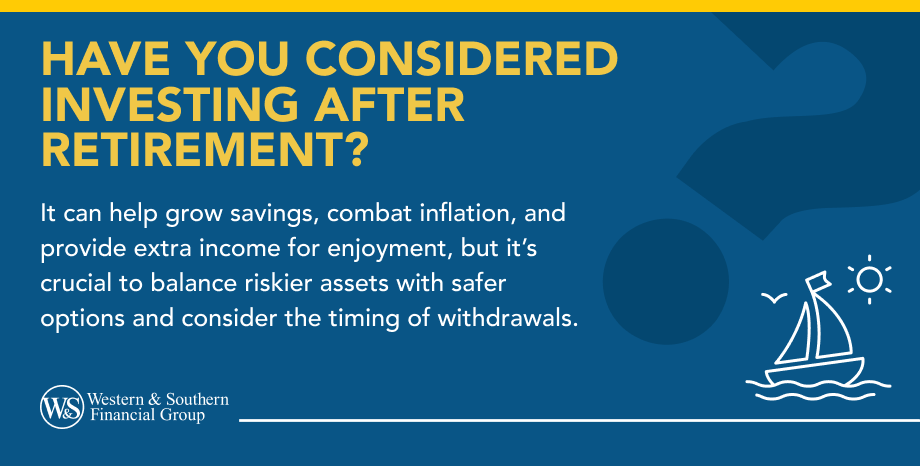

Table of Contents
Key Takeaways
- Consider a balanced retirement portfolio with safe and risky assets.
- Timing withdrawals with investment performance can impact savings longevity.
- Discuss your investment strategy with a financial representative.
- Investing after retirement can help secure your financial future and enjoy retirement to the fullest.
You worked hard your entire life and are finally ready to sit back, relax and live off your retirement savings. But before you go looking for the perfect beach chair, it might be worth reviewing your investment strategy.
Why? Because investing after retirement has important differences from investing when you were working. These strategies could help keep your golden years.
Investing After Retirement: The Whys & Hows
Once you retire, it could be a good idea to be more conservative with your savings. But what does this actually mean? One strategy is to keep more of your savings in places that have less potential to lose money and invest less in assets with higher risks. After all, if the market were to go down after you retire, you likely wouldn't have as much time to recover — and you wouldn't be earning a paycheck to replace your lost savings.
But that doesn't necessarily mean you have to stop investing altogether. Retirements are getting longer and longer — in fact, less than half of Americans are retired.1 So it’s not unreasonable to think your savings may need to last 30 years or more. And while assets like cash and bank certificates of deposit (CDs) have less risk, they don't usually earn much interest either. You may still want high-growth potential to build up enough for the future.
Investing after retirement could also help you keep up with inflation. For the 12 months ended September 2024, the annual U.S. inflation rate was 2.44%.2 Stocks and mutual funds offer a chance for greater reward consistent with greater exposure to volatility risk and possible loss, potentially helping your savings keep up with rising prices. But if you only hold money in the bank, where it might not grow as quickly, inflation could chip away at your spending power. Investing could also help grow your disposable income, giving you more money for fun goals like taking vacations, giving money to charity or leaving an inheritance for your family. Keep in mind that investing involves risk and your investment may be worth less when redeemed.
The Balancing Act
A balanced retirement portfolio might include a mix of safe assets that are less risky, as well as high-earning but riskier assets. Assets with lower levels of risk may include bank CDs, investment grade bonds, money market accounts and fixed annuities. Riskier, long-term assets could include stocks, mutual funds and perhaps real estate.
The long-term investments could help grow your portfolio for the future — while also providing extra spending money for today if you happen to see positive returns on your investments. Of course, the right balance depends on your personal situation, risk tolerance and goals.
Timing Is Everything
Understanding sequence of returns risk and how it can impact your retirement can help you project the longevity of your savings. In other words, the order in which your investments generate a return can influence how long your retirement savings may last.
To help increase the chances your savings will last, you might consider timing any withdrawals with the performance of your investments. Depending on your goals and financial situation, that could be the ideal time to take out extra to go on vacation, renovate your house or make a donation to charity.
During market downturns, on the other hand, consider cutting back on nonessential spending. This way you could avoid selling assets when they're at a low price. You could get more out of your withdrawals by cashing out when the market is up.
A Word of Advice
As you head into retirement, think about discussing your investment strategy with a financial representative or conducting a financial analysis. They could run simulations on how much you would have in retirement, the potential balance for your portfolio and how you could adjust your spending when the market is good or bad. They could also help you pick the right investments for your goals and risk tolerance.
By putting this work in now, you can relax knowing your portfolio is in better shape. Then you can worry about more important things, like planning your granddaughter's birthday and finding that perfect beach chair — it's a tough job, but someone has to do it!
All investing involves risk, including the possibility of a loss of the money invested.
Sources
- Who’s not working? Understanding the U.S.’s aging workforce. https://www.minneapolisfed.org/article/2023/whos-not-working-understanding-the-uss-aging-workforce.
- US Inflation Rate (I:USIR). https://ycharts.com/indicators/us_inflation_rate.

















